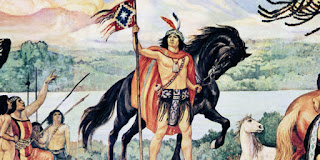 The Mapuche are the group of indigenous peoples of south-central Chile, that have inhabited the region for over 2,000 years. They are the only indigenous group in all of South America that resisted the Spanish colonizers and other important indigenous groups like the Incas. In fact, the Spanish and Mapuche war lasted for over 350 years and was denominated the 'Arauco War.' But to resist the Spanish, the Mapuche reorganized their way of life. Villages that were spread out united and formed political, economic and military alliances; the Mapuche learned to use the horse to battle against the Spanish and historical leaders such as Lautaro and Caupolican, emerged as effective strategists. Although many of the Mapuche people died from disease and violence, they were successful in attacking Spanish forts and holding onto their land. The 'Arauco War' is beautifully depicted in the 16th-century epic poem 'La Araucana,' written by Alonso de Ercilla.
The Mapuche are the group of indigenous peoples of south-central Chile, that have inhabited the region for over 2,000 years. They are the only indigenous group in all of South America that resisted the Spanish colonizers and other important indigenous groups like the Incas. In fact, the Spanish and Mapuche war lasted for over 350 years and was denominated the 'Arauco War.' But to resist the Spanish, the Mapuche reorganized their way of life. Villages that were spread out united and formed political, economic and military alliances; the Mapuche learned to use the horse to battle against the Spanish and historical leaders such as Lautaro and Caupolican, emerged as effective strategists. Although many of the Mapuche people died from disease and violence, they were successful in attacking Spanish forts and holding onto their land. The 'Arauco War' is beautifully depicted in the 16th-century epic poem 'La Araucana,' written by Alonso de Ercilla. 
The Mapuche people do not have any written documents that set out their way of life or philosophy, but their culture and traditions have been handed down from generation to generation, through narratives and storytelling, speaking and maintaining their histories. Yet, they have struggled to maintain their identity and culture. Communities have fought to stay together and to preserve their language, religion, food and medicinal knowledge, and most importantly their land.
For the Mapuche, the land is the inheritance of the entire collectivist community and for what they all fight for. And since the 1990's and shortly thereafter the Pinochet regime, the Mapuche have struggled to regain their land from the Chilean government. For the Mapuche, this fight goes beyond just a battle to win land title so that they can sell it, farm it or build hotels on it. The land, or Wallmapu as they call it, is a philosophical concept for the Mapuche. It is not just a piece of terra that is set by boundaries; land for the Mapuche is a living, intertwined mass, that serves as the basis for the community's existence. This war is between two different worldviews; one that has the Mapuche trying to restore their traditional relationship with the land and another that has Western society trying to destroy it or sell it off to companies
This violence and military intervention of the Mapuche land and territories will continue to be a serious threat to the indigenous communities who continue to peacefully resist and reiterate their right to remain on their land. The Mapuche were able to resist the Spanish colonizers for 350 years, and they continue to resist against the Chilean government. When will this violence stop? When will the indigenous people regain the rightful claim to their land?
Thank you for taking the time to read my blog....

Comments
Post a Comment